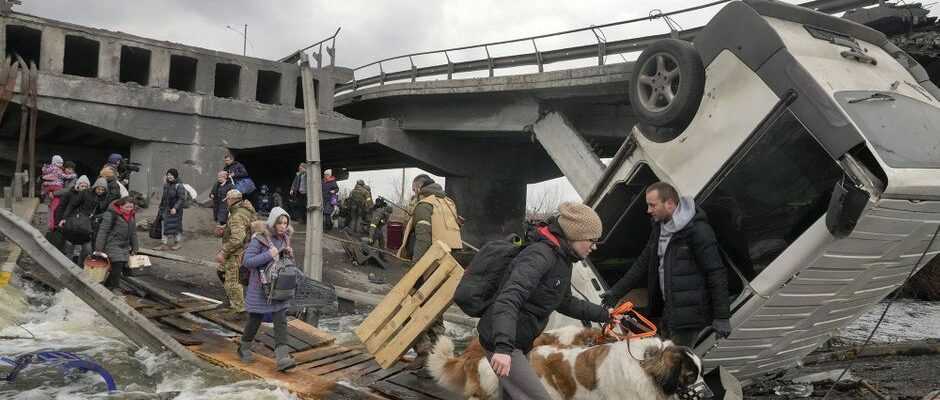A 50 cm wide plank of wood is half sunk in the icy water of the river Irpin, Ukraine. More than 10,000 people have already fled the fighting by this improvised “path” under grapeshot.
The 50 cm wide wooden board is half sunk in the icy water of the Irpin river. In five days, 10,000 people have already passed over it, to flee this small town bombarded by the Russians, the last lock before Kiev coming from the west. And on this board, everything must pass: women, babies, old people, dogs, strollers, wheeled suitcases, bicycles, injured people on stretchers and even bodies rolled up in carpets.
The concrete bridge, gaping above them, was deliberately destroyed by Ukrainian forces. “A friend took us by car to the bridge and we crossed it, he hid his car and will walk back,” says Tetyana, 51, after crossing on the plank. “It was shooting from all over the road, but we got through it,” she adds, pulling her suitcase.
Read also: Local “ceasefires” but new bombings… update on the war in Ukraine
“I’m very scared of these shots, I said to myself if, I die on the spot so it’s like that, but if I’m injured in the legs, I will have to crawl to escape and that’s not good at all,” she explains calmly. But Tetyana and the others are still far from safe. They still have an embankment and a crossroads to cross, completely uncovered.
The day before, two civilians died there, their bodies lying in the middle of their luggage, noted AFP journalists. Eight residents fleeing Irpin were killed on Sunday alone, including a family with their two children, authorities said.
Read also:11-year-old Ukrainian refugee arrives alone in Slovakia
To go as fast as possible, every movement counts: run and abandon what obstructs.
Read also:“How many children still have to die?” : The anger of Olena Zelenska, the wife of Volodymyr Zelensky
empty strollers
At this level, the road used for evacuations is littered with empty strollers, bicycles, suitcases, shopping carts and even stray pets. Once past the crossroads, still smoking from Russian strikes, Vasyl Povoroznyuk, 49, is there with his white van to take over.
This army chaplain volunteered to organize the shuttle between this first point of exfiltration and the secure area two kilometers further, through the woods and the bombs, a parking lot where ambulances, psychologists and first aid await.
“I feel neither fear nor panic”, assures the chaplain-driver, who rushes at 100km / h empty, on the road in the middle of the forest, to pick up a new group.
“They need help, if we don’t who will? It’s a matter of life and death, the more we can save the better,” he says under his khaki cap.
“Children first!” he yells at the group of 30 evacuees waiting for him, queuing in disconcerting calm, like at the post office.
“Come on, little hero,” he says to a little one who ran away from home with a plastic sword in his hand, offering one of the chocolate bars he keeps in his parka to hand out to children.
Before going up, little Ania, no more than five years old, must separate from her father who has gone to look for other members of the family: “Papouchka”, “stay!” she pleads, clinging to her mother as a menacing hiss echoes from the forest.
Evacuees are now arriving in their hundreds
The explosion makes one shudder. “Sharp boom – it’s us, whistle then dry boom – it’s their artillery” firing from further away, says Vasyl. Despite these still sporadic shots, the evacuees are now arriving by the hundreds and some are in very bad shape, like this elderly woman, carried on a carpet by six soldiers. “We bring the school buses!”, orders a policeman into his walkie-talkie, seeing this stream of people arriving.
In a few minutes, the yellow buses are there, as well as the mayor of Irpin, Oleksandr Markushyn, who is organizing this unofficial “humanitarian corridor” as best he can, uncoordinated at this stage with the Russian forces.
“Here nobody talked about + green corridor +, I think because Irpin is in the middle of a battle and has no intention of surrendering”, explains the young mayor who jumps from bus to bus, armed with a Kalashnikov and protective helmet on the head to try to reassure its population. Already 10,000 people have left this dormitory suburb for five days, with its high towers now in ruins.
“There are still 10,000 to evacuate, probably in 2 or 3 days” estimates the mayor, before adding: “And as many who refuse to leave”.
Any reproduction prohibited
